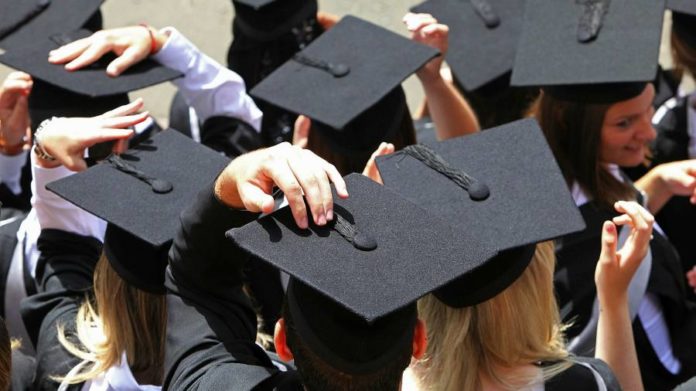Hundreds of pounds a year will be cut from the take-home pay of graduates following a government decision to lower the repayment threshold for student loans in England, hitting middle earners most while benefiting those on higher pay.
The Department for Education on Thursday announced it would reduce the salary threshold for paying back loans from £27,295 to £25,000, and increase the write-off period for student loans from 30 to 40 years. The changes will affect students starting university next year.
The changes were announced in a long-awaited response to the Augar Review, an investigation into higher education sector that delivered its recommendations in 2019.
Michelle Donelan, the higher and further education minister, said the changes were “about bringing fairness into the system” and to prevent outstanding student debt being “paid by the taxpayer”.
But Paul Blomfield, chair of the all-party parliamentary group for students, said the approach would “make graduates pay the price, with the lowest earners being hit hardest”.
The government will also cut interest rates on student loans from their current above-inflation level, allowing graduates to pay back no more than they borrow.
Currently, graduates earning above £27,250 are required to contribute 9 per cent of their salary to repaying their student loan. After 30 years the loans are written off.
The government has estimated that 54 per cent of student loans will never be paid back, with the current value of unpaid debt at £161bn.
Rishi Sunak, chancellor, is keen to cut the cost of writing-off unpaid loans and believes that the new reforms will be “sustainable”, according to his allies.
However, Dr Gavan Conlon, from economic consultancy London Economics, called the changes “regressive”.
“The graduates that will benefit the most from these policies are the highest earning, predominantly male, graduates,” he said, adding that most others “will be worse off”.
Conlon estimated that the government would recoup £540mn per cohort of graduates as a result of the changes over their working lives, equivalent to about 5 per cent of its total spending, but distributed unevenly.
Under the current system only the highest earning graduates clear their loan, and the real interest rate means they remain in the system and continue to make repayments, ultimately paying more and subsidising lower earners.
Cutting the real interest rate will mean that these earners will pay less. In contrast, extending the period of repayment to 40 years would mean that low and middle-income graduates would be repaying their debts for even more of their working lives, Conlon said.
Martin Lewis, founder of Money Saving Expert, a financial advice platform, said reducing the threshold would leave the typical graduate repaying more than £200 a year, while the extended repayment period would increase repayments by thousands.
“It [the changes] effectively completes the transformation of student ‘loans’ for most, into a working-life-long graduate tax,” he said.
The changes will not affect current students or graduates, after the government confirmed last month that their repayment threshold would be frozen at £27,250.
Lewis welcomed this but said the decision to freeze it until 2025 would add about £5,000 to the total most repay.
As well as changing loan repayment terms, the government announced more details of a consultation on more flexible loans for further education, which Donelan described as “bringing about a revolutionary change in the way students can study, retrain and upskill throughout their lifetime”.
Other measures include a decision to freeze the cap on tuition fees at £9,250 for two more years, effectively cutting university funding at a time when inflation is surging.
The government will also consult on proposals to block would-be students from accessing loan funding if they do not pass GCSE English and mathematics.
Vanessa Wilson, chief executive of University Alliance, said that “with any reduction in funding, something will have to give” in higher education. Minimum entry requirements would “fly in the face of demands from students and the economy and would be guaranteed to level-down, not up,” she said.
Credit: Source link















